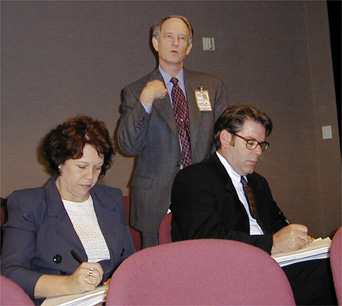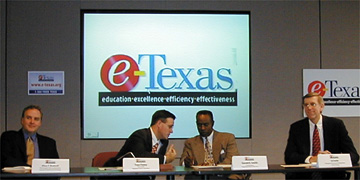| Regulatory Reform Task Force
Houston, April 12, 2000
Texas State Comptroller's Office Listens to Regulatory Reform Concerns in Houston
Summary
Changing the process of permitting and licensing various regulated industries is the key to regulatory reform in Texas, according to testimony at Texas Comptroller Carole Keeton Rylander's e-Texas hearing in Houston.
"We face challenges that are more difficult than we initially thought in the area of regulatory reform," said e-Texas Regulatory Reform Task Force Commissioner Gerald Smith. "There are things we can do, and should focus on. The regulatory process, educating the public and thinking out of the box are key in making meaningful changes."

|
|
Citizens testified on a variety of issues at the e-Texas public hearing on regulatory reform in Houston.
|
The April 12 hearing is one of many public hearings the Comptroller's Office is holding in connection with Comptroller Rylander's e-Texas initiative. E-Texas is a citizen commission charged with developing recommendations to help Texas state government meet the challenges of the Internet Age.
Major Issues
Major issues discussed by panelists and audience members included:
-
Approaching permitting in fundamentally new ways,
-
Processing permits easier and faster via the Internet, and
-
Leveling the playing field for mid-sized and small companies.
Panelists' Commentary
Allan Bedwell, now vice-president of sales and marketing for Goal Line Environmental Technologies of Knoxville, Tenn., is a former Massachusetts deputy commissioner of environmental protection. In the mid- to late 1990s, Bedwell was instrumental in overhauling Massachusetts' regulatory system.
"We had researchers looking into the permitting system and found that regulations were being added and none were being deleted," Bedwell said. "The permitting system was not working."
Massachusetts developed the Environmental Results Program (ERP) that implemented different solutions instead of trying to force a one-size-fits-all program.

|
|
Commissioners for the e-Texas Regulatory Reform Task Force heard
and discussed testimony from expert witnesses and citizens. Left to
right: Allan Bedwell, Vice President, Goal Line Environmental
Technologies; Trace Finley, Comptroller's task force team leader;
Gerald Smith, task force commissioner; and Ed Feith, Reliant Energy.
|
The ultimate goal of the ERP is to shift the permitting system's focus from telling companies how to comply and replace it with an outcome-oriented system that holds companies accountable for their performance.
The first step toward this goal was the elimination of thousands of permits for small businesses such as dry cleaners, printers and photo processors. These permits were replaced by compliance certifications that held companies accountable to committed results.
By streamlining the regulatory system, Massachusetts was able to set priorities and, therefore, spend more time on hard-core violators rather than law-abiding companies. Additionally, the system was designed to be accessible through the Internet, giving companies a more efficient method of filing regulatory reports.
Massachusetts DEP intends to expand the ERP to other industry sectors in the future.
Ed Feith, environmental department manager for Reliant Energy Wholesale of Houston, said Reliant Energy was one of the first companies to implement computer-based reporting management. He emphasized a couple of areas of caution for government and companies when looking to move to electronic reporting—security breaches that could lead to someone misrepresenting a company, and public access to computers.
Since most permitting and reporting documents include confidential information about companies and company practices, security is the number one issue to tackle before moving to electronic reporting, he said. He is particularly concerned with people being able to "hack" into information, change that information and misrepresent companies.
Second, Feith is concerned with the public being able to access the information. He said not all citizens would be able to download computer documents and not everyone is computer savvy. These documents are open record, and should be easily accessible, according to Feith.
Additionally, the panel was concerned about the burden placed on small and mid-sized companies throughout the regulatory process. Additional regulations serve as a barrier into the market leaving larger companies with an advantage, according to testimony at the hearing. Larger companies benefit from more regulation due to the ability to hire staff to take care of permitting and reporting where smaller companies do not have this luxury.
| 
